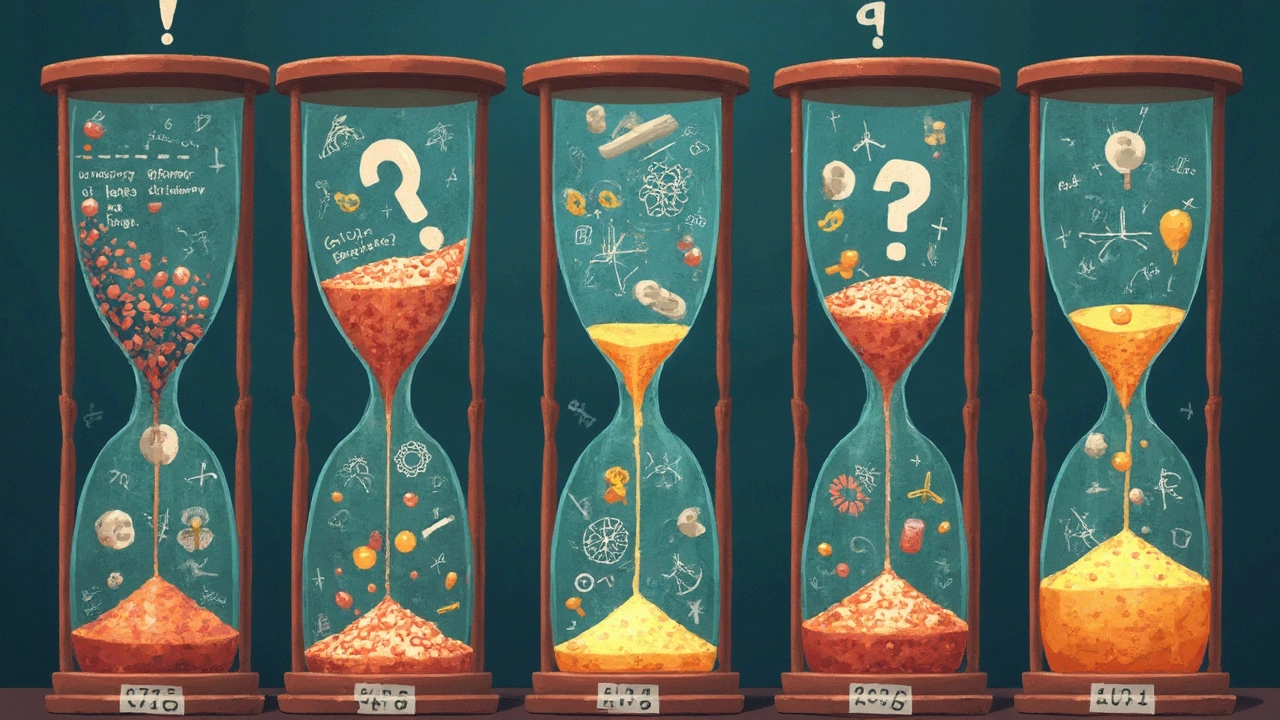The NEET exam isn't just another test; it's a rite of passage for those dreaming of donning a white coat someday. Over the years, the difficulty of this exam has caused many sleepless nights for aspiring medics. But when we talk about the 'hardest' NEET exam, we're diving into a rabbit hole of opinions, analysis, and sheer numbers.
Every NEET taker probably has their own horror story, but there seems to be a consensus forming around the notorious NEET exam of 2018. Why, you ask? This exam had a reputation for its killer Physics section, leaving many students scrambling. But hey, hold on! Difficulty isn't just about trying to solve rocket science on a deadline. Other factors played into this perception, from syllabus changes to the number of test-takers.
- A Quick NEET Overview
- Tracing the Most Challenging Year
- Factors Contributing to Difficulty
- Lessons from Tough NEET Exams
- Survival Tips for Future Aspirants
- The Myth of the 'Hardest' Exam
A Quick NEET Overview
Alright, so NEET stands for the National Eligibility cum Entrance Test. It's the gateway for students in India dreaming of a career in medicine or dentistry. Pretty much every ambitious youngster aiming for a medical course has to crack this one. The biggie here is that it's not just for government colleges but also for private ones, which makes it kind of a big deal.
NEET was introduced to streamline the process, cutting through the clutter of multiple entrance exams that were scattered across the country. One test to rule them all, if you will. Now, the NEET exam typically covers three major subjects: Physics, Chemistry, and Biology, and includes a whopping 180 questions that students need to tackle in three hours. So, it’s kind of like a marathon where speed and accuracy are your best friends.
The scoring system is pretty straightforward: you get +4 for every correct answer, and there's a -1 penalty for each wrong one. It's kind of the universal score system in entrance exams that makes you think twice before hitting that mark on the OMR sheet.
Here's a snapshot of recent NEET stats:
| Year | Registered | Appeared | Qualified |
|---|---|---|---|
| 2021 | 1,614,777 | 1,437,359 | 771,500 |
| 2022 | 1,814,992 | 1,707,230 | 938,890 |
As you can see, the competition is fierce, and it's only getting tougher.
Tracing the Most Challenging Year
When we dig into the history of the NEET exam, it's a mixed bag of challenges year to year. But if we're pointing fingers at one specific tormentor, the 2018 NEET exam stands out for many aspirants. What made it legendary (or infamous, depending on who you ask) was its unexpectedly tough Physics section. Picture this: students cramming formulas and calculations, only to find mind-bending questions waiting for them in the exam hall.
Let's be real about why 2018 became such a headache. First up, the paper followed a syllabus change, adding an extra layer of stress and uncertainty. Surprise! No one likes them, especially when stakes are this high. Plus, the competition was fierce; over 13 lakh students appeared that year, each slogging to score that medical seat.
| Year | Number of Candidates | Difficulty (out of 5) |
|---|---|---|
| 2016 | 8 lakh | 3 |
| 2017 | 11 lakh | 4 |
| 2018 | 13 lakh | 4.5 |
| 2019 | 15 lakh | 4 |
But let's really break it down. The Physics section got lots of headshakes because of how conceptually demanding it was, leaving many students feeling like they were wading through a swamp of experimental theories and calculations. And while some sections like Biology seemed a bit more reasonable, it wasn't enough to balance that whirlwind.
In hindsight, this 'hardest' year underlined a few crucial lessons. For one, it taught future test-takers the importance of not getting too comfy with the status quo. NEET has a habit of throwing curveballs. And while this might sound like a horror story, the truth is, these challenges prepared upcoming aspirants to expect the unexpected, offering a silver lining to what many consider the most daunting exam year.

Factors Contributing to Difficulty
Understanding why a certain NEET exam is labeled the 'hardest' isn't all about tricky questions. There’s a whole mix of factors at play. Let’s break down what really makes a NEET exam tougher than usual.
First off, the nature of the questions is a biggie. In some years, like 2018, the Physics section was notoriously dense, full of complex calculations that threw students off balance. NEET exam questions aren’t just about rote learning; they’re about deep understanding and application.
Next, there’s the syllabus shuffle. Sometimes, changes in the syllabus catch students by surprise, especially if significant topics are added or removed without much notice. This demands quick adaptation from students who’ve already mapped out their study strategy.
Competition intensity also plays a role. With hundreds of thousands of aspirants battling for a limited number of medical seats, a surge in the number of candidates can add pressure and influence cut-off trends, making exams appear harder.
- Physics Section: Known for its challenging numerical problems.
- Syllabus Changes: Abrupt additions or removals of topics.
- Increased Test-takers: More students mean tougher competition.
Finally, exam settings, like previous question paper trends or a sudden-increase in difficulty level, can compound the pressure. Such shifts aren’t always predictable, making preparation a game of adaptability.
So, it’s not just about whether the NEET exam was hard; it's about how students perceived and handled these collective challenges.
Survival Tips for Future Aspirants
Tackling the NEET exam isn't just about cramming last minute. It's about smart prep and keeping your cool. Here’s your no-fluff guide to getting through it.
First off, get your hands on the syllabus and past papers. Understanding the pattern is key, especially when NEET throws surprises like that infamous 2018 Physics section.
- Routine is your friend: Set a study schedule and stick to it. Regular breaks help too, so plan on studying in chunks with downtime in between.
- Visual aids are golden: Use charts, flashcards, or color-coding for better retention. It helps in smashing through complex topics a lot quicker.
- Mock tests for the win: Simulate exam conditions by timing yourself with practice papers. This not only helps with speed but also tackles the anxiety head-on.
- Focus on core subjects: Prioritize subjects where you're strong but don’t shy away from giving extra time to weaker areas.
- Group study can boost learning: Sometimes, bouncing ideas off peers or explaining concepts to them deepens understanding.
Need more convincing on how structured preparation helps? Here's a breakdown of a basic daily schedule:
| Activity | Time Allocated |
|---|---|
| Morning Study Session | 3 hours |
| Break & Leisure | 1.5 hours |
| Afternoon Review Session | 2 hours |
| Exercise/Outdoor Activity | 1 hour |
| Evening Study Session | 3 hours |
| Wind Down & Dinner | 1.5 hours |
Mindset matters too. Stress is a natural part of the process, but don't let it take over. Consider meditation or yoga to keep nerves in check. Remember, each year has its own so-called 'toughest' story, but with solid prep, you can make any NEET year your year. You've got this!

The Myth of the 'Hardest' Exam
When it comes to the NEET exam, many students, parents, and even coaching centers seem to be on a perpetual quest to identify the hardest year. But here's the kicker: labeling one year as the hardest is more complicated than it seems.
First off, what makes an exam hard is pretty subjective. Sure, 2018 sent shivers down spines due to its intense Physics section, but others argue that 2020 was way tougher because of the pandemic's wrath and resulting logistical challenges. What people often forget is that the perception of difficulty can be heavily influenced by external factors like preparation levels, individual strengths and weaknesses, and even the test day mindset.
Over the years, the format and focus of the NEET have remained pretty consistent, but slight changes in the syllabus or the weightage of certain sections can make a difference. For instance, if you're a whiz at Biology but weak in Chemistry, and one year the exam ramps up the Chemistry questions, that year will undoubtedly feel more brutal.
Moreover, the noise around the 'hardest' exam only adds pressure to future aspirants, altering their preparation strategies in possibly unhelpful ways. Students might spend hours mastering past 'difficult' papers only to find the next exam leans more on topics they overlooked.
Ultimately, while stories of the hardest NEET exams serve as cautionary tales or bragging rights, they're not the gospel truth for everyone. Each NEET journey is unique, and rather than dwelling on myths, it's more practical to focus on honing skills, understanding concepts deeply, and building a solid test-taking strategy.

